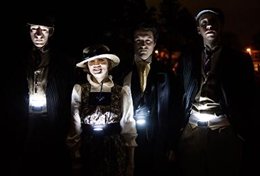It's ten o'clock on a cold, dark Saturday night in Belfast. It's raining lightly, and I'm standing outside the public conveniences in Drumglass Park, which normally shut at 5.30pm. I am not alone: huddled around me is a doughty coterie of individuals, pulling mackintoshes tighter against the elements, or slipping into complimentary 'Titanoraks', yellow cagoule-lites left over from the Land of Giants extravaganza on Queen's Island a few months ago.
They're going to need them, because most of the next forty-five minutes is spent trudging round the park precincts, to a variety of locations featured in the Kabosh company's Ghosts of Drumglass, a valiant, mainly outdoor production guaranteed to test the mettle of even the most hardened devotee of site-specific staging.
But first of all, those lavatories. They're used for the opening two scenes, in which playwright Rosemary Jenkinson introduces the character of Henry Musgrave, one of eleven adult children of Samuel and Mary. A real Belfast family, who built Drumglass House, the Musgraves were one of the richest mercantile dynasties ever to inhabit the Victorian city. Not one of the eleven siblings ever married, or produced any offspring.
So far, so factual. Jenkinson then imagines how this highly unusual situation might have happened. Why the apparent aversion to marriage? Why the childlessness? What secrets may have been lurking in the Musgrave family cupboard? Her fictional speculations form the substance of the play: the ghosts of Drumglass begin to condense eerily out of the ether, where, as Henry puts it, “the mulled fog of Belfast’s stoves and the spices of autumn hang thick as incense”.
The toilet scenes, dim-lit by lurid fluorescent tubing, are cleverly written to be viewed in either order, facilitating the division of the twenty-strong audience (there were four performances per evening) into two tens, to fit into the limited space available. In these scenes Jenkinson economically conveys a slew of basic information about the Musgrave family, via the taped voices of two former business colleagues and three of the children.
Henry, as Jenkinson imagines him, is a desperate, restless spirit, haunted by an age-old family secret which has brought the curse of barrenness upon the lineage, a secret he is determined to unravel. He dabbles in Celtic ritual and is fascinated by pathology and vivisection, a fact dwelt upon with gory relish by the businessmen, and graphically reinforced when a floppy piece of animal liver is lobbed over the top of one of the cubicles. It splats at the feet of the spectators, several of whom bend over gingerly to check the flying body-part isn’t actually twitching.
 It’s one of many moments in Ghosts of Drumglass where both Jenkinson and director Paula McFetridge toy mischievously with the conventions of the Gothic horror genre, but it’s interesting to note how carefully they avoid this tipping over into melodrama. The bangs, squeaks, howls and banshee roars mysteriously emanating from copses and tree-clusters, as the promenade around the park develops, are genuinely eerie and unsettling in the mizzly Belfast darkness, the more so for their sources being hidden by Augustine Leudar’s ingenious sound installation.
It’s one of many moments in Ghosts of Drumglass where both Jenkinson and director Paula McFetridge toy mischievously with the conventions of the Gothic horror genre, but it’s interesting to note how carefully they avoid this tipping over into melodrama. The bangs, squeaks, howls and banshee roars mysteriously emanating from copses and tree-clusters, as the promenade around the park develops, are genuinely eerie and unsettling in the mizzly Belfast darkness, the more so for their sources being hidden by Augustine Leudar’s ingenious sound installation.
Why should this be so? What exactly, beyond the fecund imaginings of Jenkinson’s fictional Musgrave family saga, are we being asked to contemplate? If Ghosts of Drumglass is indeed a horror story, then it’s a horror more akin to Kurtz’s in Conrad’s Heart of Darkness that we’re dealing with – the horror of unspeakable secrets carried as the burden of a lifetime within us, their knotted unnegotiability a stranglehold on the expression of emotions, a poison atrophying the ability to enjoy life’s natural pleasures.
For Henry Musgrave, the appalling truth about his own family is revealed in the vision of his father, Samuel, apostrophising the heavens from a climbing bay in the park’s north corner, laying a curse of childlessness upon his own children. Why? Several alternative narratives are hinted at by Jenkinson, all revolving round the death of the infant John Musgrave, brother of Henry. None of them, however, is definitively adopted: the truth about Henry is, it seems, ultimately too horrible to utter.
That is the Musgrave family secret. “What is yours?”, this boldly imaginative Kabosh production seems to be asking, as the now-sodden gaggle of spectators exits the park, processing past materfamilias Mary, obsessively washing her hands in a red-stained bowl of water. There is plenty to reflect on, not least the intense performance of James Doran as a wild-eyed Henry, and a splendidly lugubrious (and darkly humorous) cameo by Michael Liebmann as the Musgrave family gardener.
There are haunting sounds and images too – of distant, white-robed children reciting nursery-rhymes in a playground, of monastic figures, faces ghoulishly uplit, perched silently on park-benches, and of a rocking-horse, swaying back and forward in a solitary bandstand, with no one riding it. These wordless characters, expertly directed, add extra layers of resonance and suggestion to the journey backwards into a family’s haunted memories.
The striking audio-visual effects add significantly to the cumulative impact of Jenkinson’s leanly efficient script, which probes insistently beyond the superficialities of its grand guignol trappings to what may have been the inner life of her characters. “I know the ground”, she has the Musgraves’ gardener say at one point. “By every turn of it, I know what’s below”. But do we really know what lies beneath? Do we ever? And do we actually want to know?
Terry Blain